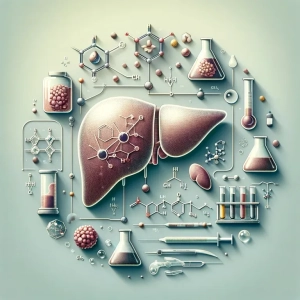Enhancing Liver Health: The Role of Natural Compounds and Biological Processes
An Exploration of Turmeric, Garlic, Apple Cider Vinegar, and Dimethylglycine in Liver Function and Detoxification

Turmeric and Liver Health
Turmeric, primarily through its active compound curcumin, has been studied for its potential in supporting liver health. Clinical trials suggest that turmeric or curcumin supplementation can lead to significant reductions in liver enzymes like ALT and AST, which are markers of liver function and damage, particularly in conditions like nonalcoholic fatty liver disease (NAFLD).
The Chemistry of Garlic and Its Role in Liver Detoxification
Garlic, a common ingredient with a rich history as both a food and a medicinal plant, contains a wealth of chemical compounds that contribute to its health benefits. One of the key active compounds in garlic is allicin, a sulfur-containing compound responsible for its distinctive odor and many of its therapeutic effects.
Allicin and Detoxification
Allicin is produced when garlic is chopped or crushed, triggering an enzymatic process that converts the compound alliin into allicin. Allicin is known for its antimicrobial and anti-inflammatory properties, but it also plays a role in detoxification. The sulfur in allicin and other sulfur-containing compounds in garlic can help support phase II detoxification processes in the liver. These processes involve conjugation, where toxins are linked with another substance, like sulfur, to make them less harmful and easier to eliminate from the body.
Sulfur Compounds and Liver Health
Sulfur compounds are particularly effective in the conjugation of heavy metals and other toxic substances, aiding in their excretion from the body. Garlic’s high sulfur content is believed to enhance the synthesis of glutathione, an antioxidant that is pivotal for detoxification within the liver. Glutathione binds to toxins, transforming them into a form that can be excreted in bile or urine.
Garlic and Enzymatic Activity
Moreover, garlic has been shown to influence the activity of various liver enzymes involved in detoxification. It can induce the activity of cytochrome P450 enzymes, which are essential for phase I detoxification, where substances are metabolized into smaller fragments. Garlic can also modulate the activity of enzymes involved in phase II detoxification, such as glutathione S-transferases, which attach glutathione to toxic substances, preparing them for excretion.
Apple Cider Vinegar: Anecdotal Efficacy and Believed Benefits for Liver Detoxification
Apple cider vinegar (ACV) is heralded in many traditional and alternative health circles for its purported benefits, despite the lack of robust scientific evidence to support all claims. It is a fermented product made from crushed and aged apples, which results in an acidic liquid containing acetic acid, vitamins, minerals, amino acids, organic acids, and polyphenolic compounds.
Digestive Aid and Prebiotic Function
Many people consume ACV believing it can act as a digestive aid. The theory suggests that the acidic nature of vinegar may help with the breakdown of foods, and the prebiotic content in the form of fermented fibers can promote a healthy gut microbiome. A healthy gut is often linked to improved detoxification processes, as it can influence liver health and the elimination of toxins.
Metabolic and Enzymatic Support
ACV is also thought to stimulate metabolism and influence enzymes that regulate the detoxification pathways in the liver. Anecdotally, some users claim that ACV enhances bile production and supports the liver in its role of filtering and processing blood. Bile is essential for digesting fats and also serves as a route of excretion for many waste products.
Blood Sugar Regulation
One of the more studied aspects of ACV is its potential effect on blood sugar levels. Some research suggests that ACV may improve insulin sensitivity and help lower blood sugar responses after meals. Stable blood sugar levels are crucial for the overall function of the liver, as they can reduce the organ’s workload and help maintain its detoxification efficiency.
Weight Management
ACV is often included in weight management protocols, with users claiming that it can help curb appetite and burn fat, although scientific validation of these effects is limited. By potentially contributing to weight management, ACV may indirectly support liver health, as excessive weight gain is a risk factor for fatty liver disease, a condition that impairs the liver’s detoxification abilities.
Antioxidant Effects
The polyphenolic compounds present in ACV act as antioxidants. Anecdotal claims suggest that these antioxidants help neutralize free radicals, thus reducing oxidative stress and supporting the liver’s natural detoxification processes.
The Inflammatory Response and Liver Detoxification
Cytokines such as TNF-alpha and IL-6 play a role in the body’s inflammatory response. The liver’s response to injury and infection involves these cytokines, with chronic high levels being associated with various health problems, including liver diseases. Turmeric has been noted for its potential to regulate the production and activity of these cytokines due to its anti-inflammatory properties.
Glutathione: The Master Detoxifier
Glutathione is a critical antioxidant in liver detoxification pathways, helping to neutralize free radicals and support detoxification. Its production is vital for liver function, and substances like DMG enhance glutathione synthesis, aiding in the liver’s detoxification processes.
Dimethylglycine (DMG) and Liver Function
DMG is considered to support liver health and detoxification by enhancing glutathione production and acting as a lipotropic agent. It provides methyl groups necessary for detoxification and other biological processes, which is crucial for the elimination of toxins.
—
Conclusion
Natural compounds such as turmeric, apple cider vinegar, and DMG hold potential in supporting liver health and enhancing detoxification pathways. Turmeric, with its curcumin content, shows promise in reducing liver enzymes and the severity of NAFLD.
DMG supports liver function by boosting critical detoxification pathways and enhancing the body’s production of glutathione, the cornerstone of cellular detoxification.
Each of these substances contributes to the complex biological processes that maintain liver health and facilitate detoxification, highlighting the potential of natural compounds in supporting bodily functions.
